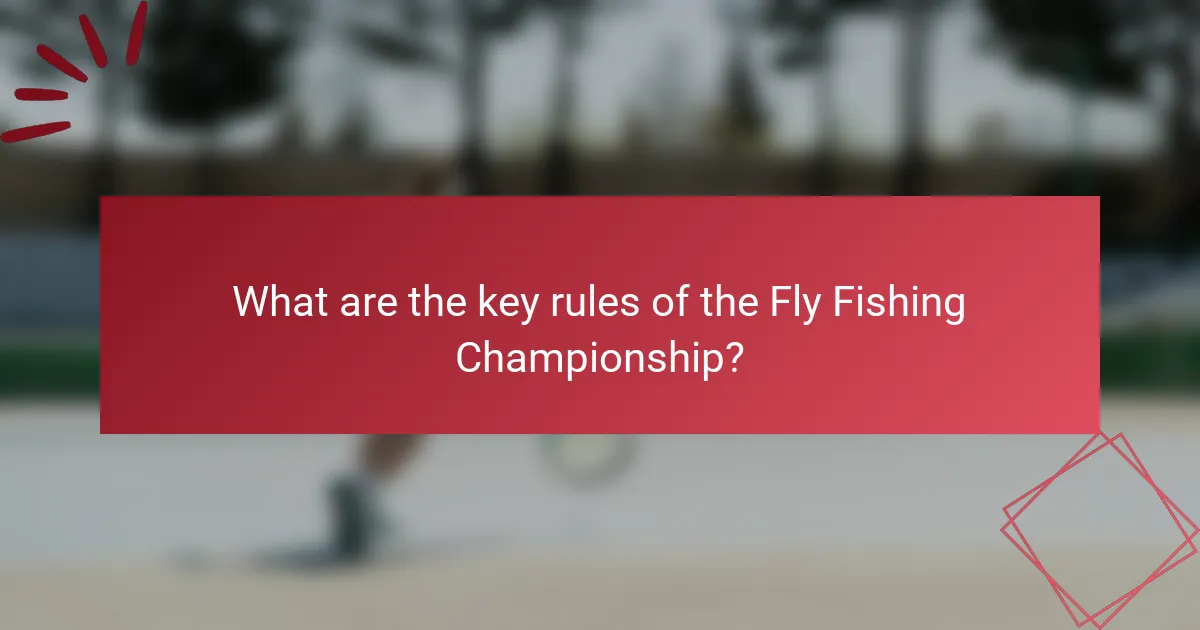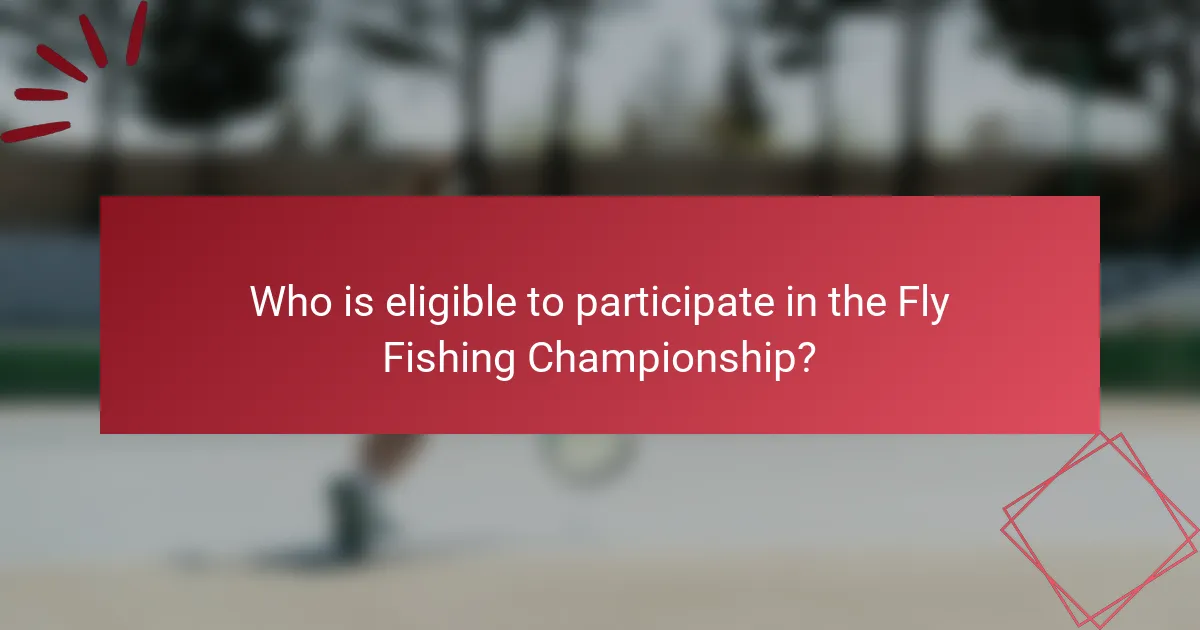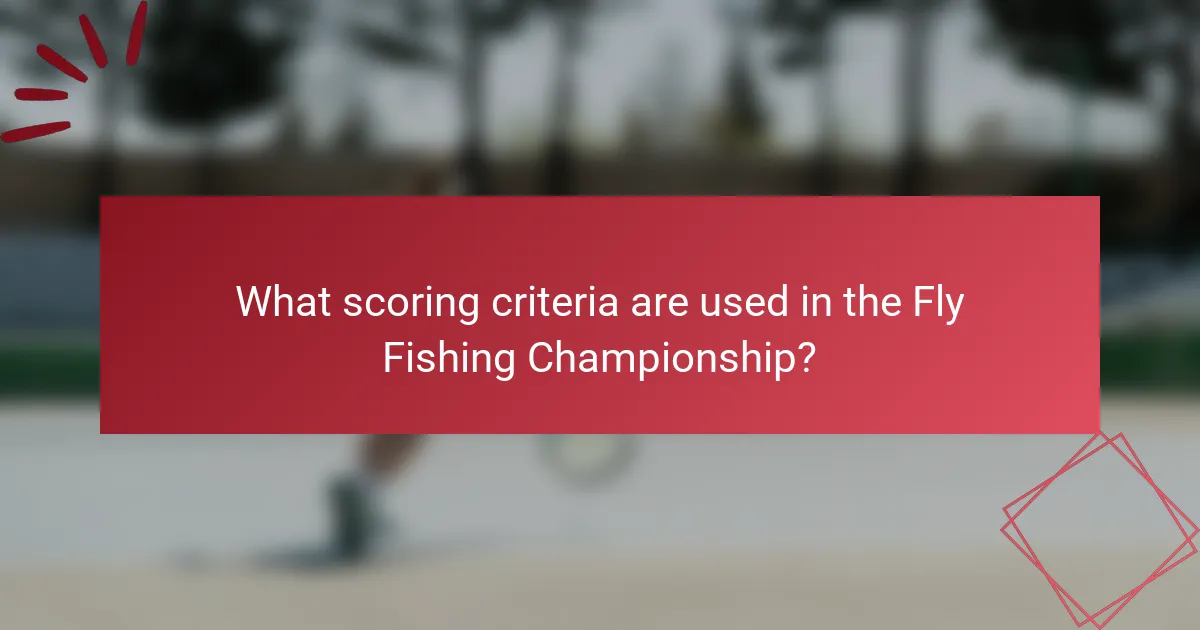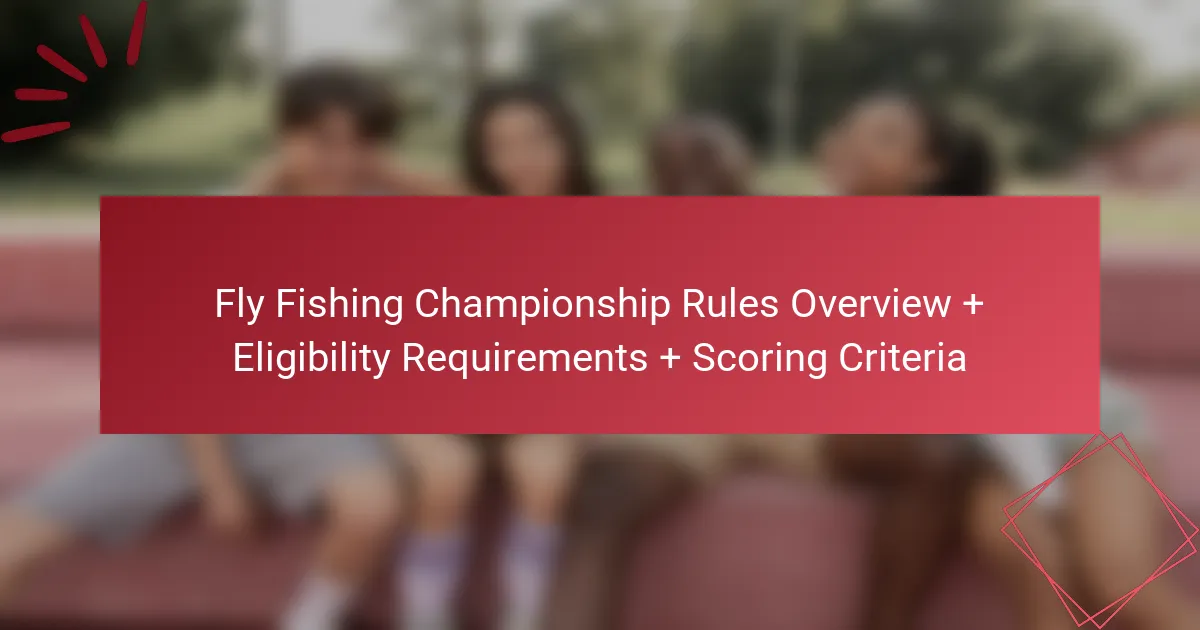The Fly Fishing Championship encompasses specific rules governing participation, competition, and scoring. Competitors must use artificial flies, adhere to designated fishing areas, and follow mandatory catch-and-release practices. Eligibility criteria include being at least 18 years old, possessing a valid fishing license, and potentially having prior tournament experience. Scoring is based on the number and size of fish caught, with additional points awarded for technique and presentation. Overall, these guidelines ensure a fair and competitive environment for all participants in the championship.

What are the key rules of the Fly Fishing Championship?
The key rules of the Fly Fishing Championship include specific guidelines for participation and competition. Competitors must use artificial flies only, adhering to designated patterns. Each angler is assigned a specific fishing area to ensure fair play. Catch-and-release practices are mandatory for all fish caught during the event. Time limits are established for each round, typically ranging from two to three hours. Scoring is based on the number and size of fish caught, with penalties for rule violations. Additionally, all participants must adhere to local fishing regulations and safety protocols. These rules ensure a fair and competitive environment for all anglers.
How are the rules structured for participants?
The rules for participants in the Fly Fishing Championship are structured to ensure fairness and consistency. Participants must adhere to specific guidelines regarding equipment, techniques, and conduct. Rules dictate the types of rods, reels, and lines allowed. Participants are also required to follow designated fishing areas and time limits. Scoring criteria are based on the number and size of fish caught. Violations of rules can lead to disqualification. These structures promote a competitive yet respectful environment. The rules are outlined in official championship documentation to ensure clarity.
What are the essential regulations regarding equipment?
Essential regulations regarding equipment in fly fishing championships include the use of specific types of rods, reels, and lines. Rods must typically be of a designated length and weight class. Reels must be compatible with the rod and line used. Lines must conform to specified weight ratings and types. Additionally, leaders and tippets must meet minimum length and diameter requirements. The use of barbless hooks is often mandated to promote fish safety. Equipment must also be free of any modifications that could enhance performance unfairly. These regulations ensure a level playing field and promote fair competition among participants.
What restrictions are in place for fishing methods?
Restrictions for fishing methods in the context of fly fishing championships include the use of artificial flies only. Participants cannot use live bait or any other fishing methods outside of fly fishing. Additionally, specific gear limitations may apply, such as rod length and line weight. Each championship may have unique rules regarding the types of flies that can be used. These restrictions ensure fair competition and maintain the integrity of the sport. Compliance with these rules is mandatory for all participants. Violations can lead to disqualification from the event.
Why are these rules important for fair competition?
These rules are important for fair competition because they ensure a level playing field for all participants. Fair competition promotes integrity and trust among competitors. It prevents cheating and enhances the legitimacy of the championship. By establishing clear guidelines, all participants understand the expectations and requirements. This clarity minimizes disputes and fosters a spirit of sportsmanship. Furthermore, adherence to rules ensures that skill and technique are the primary factors in determining winners. Historical evidence shows that structured rules lead to more engaging and competitive events. For instance, standardized scoring criteria have been proven to increase participant satisfaction and audience engagement in competitive sports.
How do the rules ensure safety during the championship?
The rules ensure safety during the championship by establishing guidelines for participant conduct and equipment use. These rules mandate the use of personal flotation devices for all anglers. They also require safety briefings before the event begins. Specific regulations limit fishing in hazardous areas, reducing risks of accidents. Additionally, emergency procedures are outlined for medical situations. The rules promote a safe environment by enforcing compliance with local regulations. Regular inspections of equipment ensure it meets safety standards. These measures collectively contribute to a safer championship experience for all participants.
What role do the rules play in maintaining sportsmanship?
Rules play a crucial role in maintaining sportsmanship in fly fishing championships. They establish a framework for fair competition among participants. By outlining acceptable behaviors, rules help prevent cheating and promote integrity. For example, specific regulations on gear and techniques ensure all anglers compete on equal footing. Additionally, rules often include penalties for unsportsmanlike conduct, reinforcing the importance of respect among competitors. This structured environment fosters camaraderie and mutual respect. Ultimately, adherence to rules enhances the overall experience for participants and spectators alike.

Who is eligible to participate in the Fly Fishing Championship?
Participants in the Fly Fishing Championship must be at least 18 years old. They should possess a valid fishing license for the competition area. Competitors may need to register in advance. Some championships may require prior tournament experience. Specific eligibility criteria can vary by event. Always check the official rules for the championship you wish to enter.
What are the general eligibility requirements?
General eligibility requirements for the Fly Fishing Championship include age, residency, and registration criteria. Participants must be at least 18 years old. They must also be residents of the country hosting the championship. Additionally, all competitors must complete the registration process before the specified deadline. Proof of age and residency may be required during registration. These requirements ensure a fair and organized competition.
Are there age restrictions for participants?
Yes, there are age restrictions for participants. Typically, participants must be at least 18 years old to compete. Some events may allow younger participants with parental consent. Specific age requirements can vary by championship. Always check the official rules for the event you are interested in.
What qualifications must competitors have?
Competitors must have a valid fishing license and must adhere to the specific regulations of the championship. Additionally, they should possess skills in fly casting and knowledge of local fish species. Experience in competitive fly fishing is often required. Some championships may also require participation in qualifying events. Proof of these qualifications may include documentation of past competitions or certifications. Each championship may have unique eligibility criteria that competitors must meet.
How does eligibility impact the competition landscape?
Eligibility significantly impacts the competition landscape by determining who can participate in events. It sets the criteria for entry, which can include age, skill level, and residency. These criteria shape the pool of competitors, influencing the overall competitiveness of the event. For instance, stricter eligibility requirements may lead to a higher skill level among participants. This can enhance the quality of competition and attract more spectators. Conversely, lenient eligibility may broaden participation but dilute the competitive edge. Ultimately, eligibility influences not just who competes but also the event’s reputation and appeal within the fly fishing community.
What factors influence the number of participants?
The number of participants in a fly fishing championship is influenced by several factors. Key factors include the championship’s location, which affects accessibility. Weather conditions can impact participant turnout, as adverse weather may deter anglers. The level of promotion and marketing of the event plays a significant role in attracting participants. Additionally, the prize offerings can incentivize more anglers to compete. The reputation of the championship also influences participation, as well-established events tend to attract more competitors. Lastly, scheduling conflicts with other events can limit the number of participants available to compete.

What scoring criteria are used in the Fly Fishing Championship?
The scoring criteria used in the Fly Fishing Championship include the number of fish caught, the size of the fish, and the technique employed. Competitors are awarded points based on the total length of the fish they catch. Each species of fish may have different point values assigned. Additionally, judges evaluate the angler’s casting technique and presentation. The overall performance is assessed to determine the winner. These criteria ensure a fair and competitive environment. Points are tallied to rank participants in the championship.
How is scoring determined during the competition?
Scoring during the competition is determined by the number of fish caught and their total weight. Each fish caught contributes to the competitor’s overall score. Competitors must adhere to specific size and species regulations. Points may vary based on the species of fish, with certain species awarded higher points. Additionally, penalties may apply for violations of competition rules. Judges monitor and verify all catches to ensure compliance. Accurate scoring is crucial for determining rankings and winners.
What are the main metrics for scoring performance?
The main metrics for scoring performance in fly fishing championships include the number of fish caught, the size of the fish, and the time taken to catch them. The number of fish caught is a primary metric, as it directly reflects the angler’s success. The size of the fish is also crucial, as larger fish typically score higher points. Time taken to catch fish can influence performance, with quicker catches often indicating better skill. These metrics are commonly used in various competitions to evaluate and rank participants effectively.
How do judges evaluate each participant’s catch?
Judges evaluate each participant’s catch based on specific criteria. They assess the size and species of the fish caught. Weight and length measurements are taken for accuracy. Judges also consider the technique used in catching the fish. Points are awarded for skillful casting and retrieval methods. The overall presentation of the catch is another factor. Judges look for proper handling and presentation of the fish. Each criterion contributes to the final score awarded to the participant. This scoring system ensures a fair evaluation of all participants.
Why is understanding the scoring criteria crucial for competitors?
Understanding the scoring criteria is crucial for competitors because it directly impacts their performance and strategy. Competitors must know how points are awarded to optimize their tactics. Clear knowledge of the criteria allows them to focus on high-scoring techniques. It also helps in identifying which aspects of their performance need improvement. Furthermore, understanding the scoring system can reduce confusion during the competition. Competitors can align their efforts with judges’ expectations. Ultimately, this knowledge can enhance their chances of winning. Competitors who are unaware of the scoring criteria may perform poorly despite their skills.
What strategies can participants use to maximize their scores?
Participants can maximize their scores in fly fishing championships by employing several effective strategies. First, understanding the scoring criteria is crucial. Participants should familiarize themselves with the specific rules and points allocation for various aspects of the competition. Second, practicing casting techniques can enhance accuracy and distance. Consistent practice can lead to improved performance during the event. Third, selecting the right flies for the target fish species can significantly increase catch rates. Research indicates that matching the hatch improves success in fly fishing. Fourth, participants should pay attention to water conditions and fish behavior. Observing these factors can lead to better decision-making on where to cast. Finally, maintaining patience and focus during the competition is essential. Participants who remain calm and strategic are more likely to perform well under pressure.
What tips can enhance success in the Fly Fishing Championship?
Practice casting techniques to improve accuracy. Accurate casting is crucial in competitive fly fishing. Use a variety of flies to adapt to different conditions. This flexibility increases your chances of attracting fish. Study the specific waters where the championship takes place. Understanding the environment helps in selecting the right strategy. Pay attention to weather patterns and their effects on fish behavior. Fish are more active during specific conditions. Maintain a calm demeanor to avoid spooking fish. A steady approach can lead to more successful catches. Finally, participate in local competitions to gain experience. Real-world practice builds confidence and skill for larger events.
The Fly Fishing Championship is a competitive event governed by specific rules that ensure fairness and safety among participants. Key regulations include the mandatory use of artificial flies, adherence to designated fishing areas, and strict catch-and-release practices. Eligibility requirements stipulate that competitors must be at least 18 years old and possess a valid fishing license, while scoring criteria focus on the number and size of fish caught, as well as the techniques employed. This overview provides essential insights into the championship’s structure, participant requirements, and evaluation methods to maintain a competitive and respectful environment.
